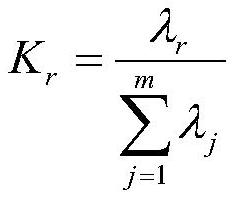A gis state recognition method based on vibration signal principal component analysis
A principal component analysis, vibration signal technology, applied in character and pattern recognition, testing of mechanical parts, testing of machine/structural parts, etc., can solve the problem that the mechanical state and feature quantity are not in a one-to-one correspondence, and increase the workload of the computer , reduce the calculation speed and accuracy, etc., to achieve the effect of high accuracy, improved accuracy and speed, and fast convergence speed
- Summary
- Abstract
- Description
- Claims
- Application Information
AI Technical Summary
Problems solved by technology
Method used
Image
Examples
Embodiment
[0044] Such as figure 1 Shown, a kind of GIS state recognition method based on vibration signal principal component analysis method, described method comprises:
[0045] Step 1: Install a vibration acceleration sensor on the GIS to collect multiple groups of vibration signals under normal and fault conditions of the GIS;
[0046] Step 2: Process the GIS vibration signal collected in step 1, extract the time domain, frequency domain and energy features of the GIS vibration signal respectively, and construct the composite feature vector of the GIS vibration signal;
[0047] Step 2.1: Extract the time-domain features of the GIS vibration signal, including the peak-to-peak value, average value, skewness and kurtosis of the GIS vibration signal;
[0048] (1) peak-to-peak value
[0049] The peak-to-peak value can represent the GIS vibration intensity, and the calculation formula is:
[0050] x pp =x max -x min (1)
[0051] Where: x max Indicates the maximum value of the GIS...
PUM
 Login to View More
Login to View More Abstract
Description
Claims
Application Information
 Login to View More
Login to View More - Generate Ideas
- Intellectual Property
- Life Sciences
- Materials
- Tech Scout
- Unparalleled Data Quality
- Higher Quality Content
- 60% Fewer Hallucinations
Browse by: Latest US Patents, China's latest patents, Technical Efficacy Thesaurus, Application Domain, Technology Topic, Popular Technical Reports.
© 2025 PatSnap. All rights reserved.Legal|Privacy policy|Modern Slavery Act Transparency Statement|Sitemap|About US| Contact US: help@patsnap.com



